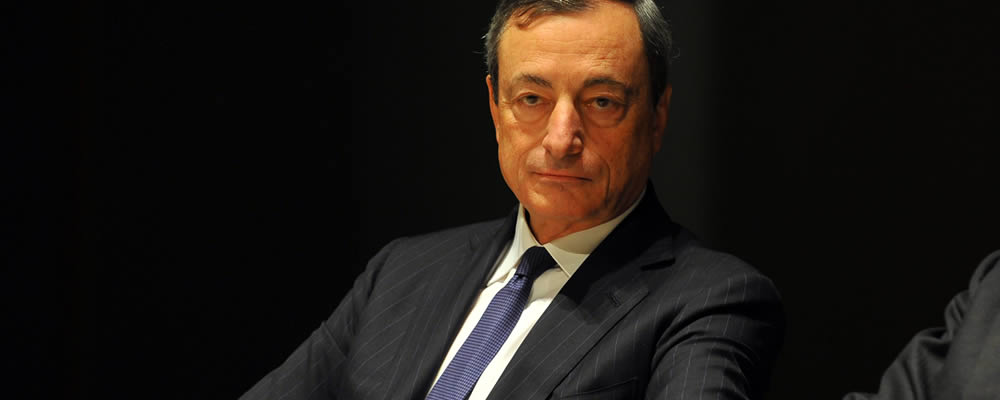- EUR GBP Pressured by Dovish ECB – Draghi warns of further stimulus if the economic situation worsens.
- UK Retail Sales Fall – Pound weakened by surprise fall in sales in the run up to Christmas.
- German PMI Data Ahead – Euro may advance next week if economic data improves.
The EUR GBP exchange rate continued sliding yesterday following the latest policy meeting at the European Central Bank.
ECB Outlook Weighs on Euro Pound (EUR GBP)
The Euro Pound (EUR GBP) exchange rate continued its steady decline on Thursday as the ECB met for its latest policy meeting.
As expected, members of the bank voted to hold interest rates at 0% as the ECB continues to target a 2% Eurozone inflation rate.
However it was ECB President Mario Draghi’s dovish tone regarding the central bank’s bond-buying scheme that caused the single currency to waver.
Investors had hoped that the recent uptick in the European economy may have caused the ECB to begin to discuss the potential tapering of its quantitative easing programme, especially after the minutes from the previous meeting showed that they had been some dissent from members against extending it to December 2017.
While Draghi admitted that the Eurozone was strengthening, he argued that continuing economic uncertainty and concerns over the stability of the bloc could force the ECB to extend its stimulus package even further. As Draghi explained;
‘In particular, if the outlook becomes less favourable, or if financial conditions become inconsistent with further progress towards a sustained adjustment in the path of inflation, we stand ready to increase our asset-purchase programme.’
Pound Weakened by Retail Data
The Pound’s rally came to an end on Friday morning as the Office for National Statistics (ONS) reported an unexpected decline in UK Retail Sales.
Retail sales tumbled from 5.7% to 4.3% in December, falling considerable short of an expected rise to 7.2% over the holiday period and fell at their fast rate since 2012.
This does not bode well for Sterling as sales are only predicted to get worse in 2017 amid the accelerated rate of inflation and expected price hikes in late January as retailers renegotiate with suppliers following the devaluation of the Pound. Alan Clarke, economist at Scotiabank, said;
‘We know from the CPI [inflation] data earlier in the week that prices rose more than expected in December and now we also know that sales volumes fell. This is likely to be the theme for the rest of the year – higher prices will reduce disposable income and hurt consumer spending growth.’
More confusing was that the fall in sales seems to contrast with the upbeat data released by UK retailers last week as most high street stores reported an uptick in business in the run up to Christmas.
EUR GBP Exchange Rate Forecast: German PMI Data Ahead
The EUR GBP exchange rate may rise next week following the release of Markit’s PMI report for Germany, with analysts predicting that both the Services and Manufacturing PMI’s will show some improvement in January.
In terms of UK data investors will be focusing on Britain’s Q4 GDP report on Thursday with the Pound likely to appreciate if UK growth continues its recent uptrend.
Meanwhile on the political spectrum the UK’s Supreme Court will finally give its judgement on whether the British government has the right to trigger Article 50 without the consent of parliament on Tuesday. Should the ruling be in the favour of the government then Sterling is likely to fall as the government will be able to proceed with its plans for a ‘hard Brexit’.
Current Interbank Exchange Rates
At the time of writing the EUR GBP exchange rate was trending around 0.86 and the GBP EUR exchange rate was trending around 1.15.



